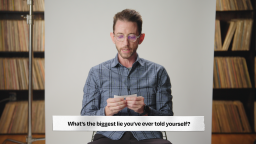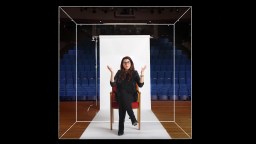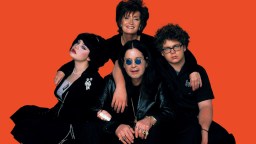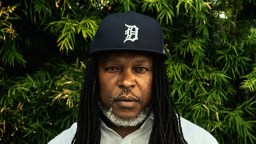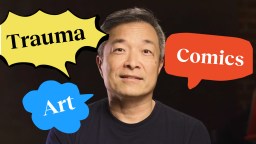“Sometimes I look back and think, ‘Wow, you were a warrior to go through what you went through,’” legendary Ravens’ tackle Michael Oher tells us. And after hearing his painful yet inspirational life story, we have to agree.
The 37-year-old football star grew up in the aptly named Hurt Village, a neighborhood in Memphis plagued by poverty, gangs, and drugs. It was his family’s addiction to crack cocaine that led to him wandering the streets with his brothers when he was just a toddler.
“I was homeless at 3 years old and in and out of foster care from 3 to 10,” Oher reveals. “I was on the streets alone. When you’re walking around hungry, you’re angry all the time and upset at the world because you can’t do anything about it. You’re thinking: How can I cure this pain that I have?”
But he didn’t let this challenging upbringing stop him from developing positive perceptions about what waited ahead for him. He vividly remembers watching Michael Jordan play on TV as a child, a god-like figure that would become his inspiration to make something of his life.
“I saw the future,” he explains. “I saw where I could end up if I gave 100%. It was that point right there that helped propel me – and it was pivotal. I understood the difference between kids who put in the work to be Michael Jordan and the kids who weren’t willing to put in the hard work to be successful.”
But before he could start meaningfully putting in the work, he needed to separate himself from the people who held him back: his own family. “I was tired of not having a routine, tired of going from house to house and couch surfing and having to run from the authorities,” he says. “I understood that you had to separate yourself from the people who aren’t willing to sacrifice and go out and do the things you need to do…you can’t allow those things to hold you back. Getting rid of that attachment to my family was the most important thing I did. If I didn’t, I’d still be in the same situation.”
It worked. Oher went on to become a unanimous All-American, a Super Bowl champion, had a movie released that was based on his life (The Blind Side), and started the family he always wanted (he has four children with his long-term partner).
“I understood that it was up to me to go out there and chase that dream,” he explains. “Even though I was living in a shack with no locks on the doors and no windows, I didn’t see it that way. Everyone was in a tough situation. I just got up, made the bed that I had, and cleaned the room up when there was nothing. That was me healing what was around me.”
Although he’s tried, Oher says he will never truly heal from his past trauma – and he wants young people going through similar situations to be aware of that reality. But he does have tried-and-tested advice on how you can stop from drowning in the pain that comes with it.
“Keep your head down, go out, meet people halfway, and do what’s right,” he advises. “If you stay consistent and find discipline, you can go out and be successful. Action is everything.”
We spoke to Michael Oher for Perception Box Stories Untangled, a Big Think interview series created in partnership with Unlikely Collaborators. As a creative non-profit organization, they’re on a mission to help people challenge their perceptions and expand their thinking. Often that growth can start with just a single unlikely question that makes you rethink your convictions and adjust your vantage point. Watch Michael Oher’s full interview above, and visit Perception Box to see more in this series.
Words: Jamie Carson
MICHAEL OHER: My first memory is three years old and I can remember me and my brothers, we were walking down the street looking for shelter, looking for somewhere to go. And I can remember my brother laying me down on the ground to change my diaper. And finally we ended up in a shed behind a house. And we spent the night there a couple of nights. And that's the first memory I had. I still remember it vividly.
I grew up in Hurt Village. As I think back now, a lot of people were hurting every single day. It was definitely ironic. You know, crack cocaine, the drug epidemic. It destroyed generations. My family. I don't have a close bond with anyone in my family because of drugs, because of crack cocaine.
I was homeless from three years old, in and out of foster care from 3 to 10. I was on the streets alone. When you're walking around hungry, you're angry all the time and you're just upset at the world basically, because you can't do anything about it. You're thinking, you're sitting around, How can I go cure this pain that I have?
What I would do, I would go to the grocery stores or gas stations and I would go steal. And that's just the way I had to eat.
I was alone a lot and how I would pass my time, I would watch a lot of movies. I loved movies. I loved TV. I can remember at seven, everyone around the TV, everyone's cheering, Michael Jordan. Then my mind thinking back on it, I'm like, Wow, this is incredible. He's like a god. He's being worshiped. Everyone's cheering and everyone's around the TV just to see this guy right here.
So, that was the first thought of something that inspired me. I kind of saw the future, basically. I saw where if I just take my mind and give my mind 100% into where I wanted to go, I could go out and do something special. From that point right there at seven years old. It helped propel me and it was very pivotal.
I understood the difference between kids who will put in the work to be Michael Jordan and the kids who weren't willing to put in the hard work to be successful. When I looked at myself in the mirror, I wasn't going to blame anyone but myself because I understood the people around me was on drugs and they couldn't help me.
And everyone was in a tough situation. I understood that it was going to be up to me, to go out there and chase whatever dream that I wanted to chase. Sometimes I think back man, you were, you really, you are a warrior. To go through with that you went through because even though I was living in a shack with no locks on the doors, no windows to me, I didn't see it that way.
I got up, I made the bed that I had. I cleaned the room up, when there was nothing. But that was me healing what was around me. I don't see how I did it. I'm like, Jesus, you're an extraordinary kid when I think back on me sometimes.
One of the things that The Blind Side, the movie, didn't tell about me is the hard work and the things that I did up until that point. It got thrown away a little bit.
And that's something that's a message that I would like for the young people to know. You put your head down. You go out, you meet people halfway. You do what's right. You stay consistent, find discipline, and you can go out and be successful. Actions is everything to me. Every single day, my mindset was to do the right thing.
That was waking up, going to school on my own, not being disrespectful, not joining gangs, not doing the things that surround me because I didn't want that cycle to continue.
I can remember the exact day when I just couldn't do it anymore. I was just tired of not having a routine, tired of going from house to house and couch surfing and having to run from the authorities. So, I just understood that you have to separate yourself from the people who aren't willing to sacrifice and go out and do the things that you're willing to do, and you can't allow those things to hold you back.
That was the most important thing that I ever done, was to be comfortable with that separation and getting rid of that attachment to my family members. Because if not, I think I'd still be in the same situation.
The thing I've healed the most today is, I don't think you are ever completely healed. I think family is the most important because that's what I was chasing for, ever.


